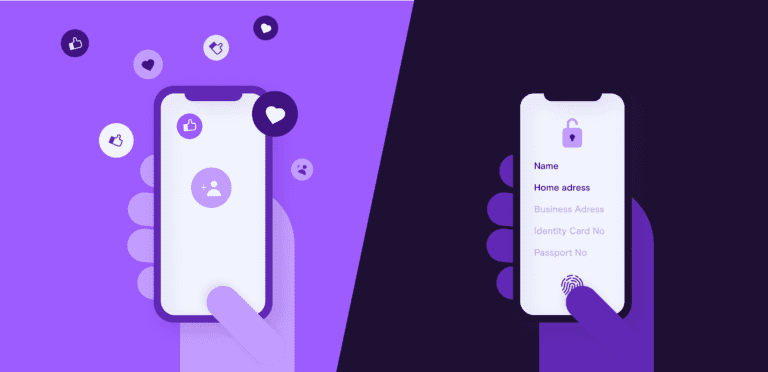Social media has always had its pros and cons. In this article, we highlight these points and tell users how to use social networks wisely.
Social media has always had its pros and cons. In this article, we highlight these points and tell users how to use social networks wisely.
In early October 2021, former Facebook data scientist Frances Haugen took the social media monolith to task in front of a Senate subcommittee. Haugen’s damning testimony combined with long-running privacy concerns, fake news allegations, and continued backlash from The Social Dilemma left more and more users reconsidering their relationship with Facebook and other social media platforms. With over 4.48 billion users worldwide, there are bound to be passionate communities on both ends of the discussion, but for the rest of us, now is the time for balancing the positives and negatives of our relationship with the sweeping world of social media. For every privacy concern, there’s a family member we’ve managed to stay connected with and for every Social Dilemma, another community engagement effort.
So, is social media worth the compromise? We’ve collected a balanced offering of pros and cons to help inform your decision.
The Pros of Social Media
1.Social media promotes building and maintaining relationships. Whether you’re staying in touch with a high school friend or sharing family photos with grandparents, the initial promise of any social media platform has always been the ability to share human experiences. That strength has evolved beyond maintaining in-person connections and into helping like-minded users find each other in an online environment. Social media shortens distances and national barriers to unite people worldwide around their common interests. Whether that’s a shared group, trend, or photo album, these platforms offer their audiences a place beyond their immediate surroundings to find their digital tribe.
2.Social media increases access to information
Social media spreads information farther than any other platform. In fact, according to the Pew Research Center, just over half of Americans get their news from social media. Be it a baby announcement or a crisis event, no other tool has the reach and expediency of social media. Platforms like Twitter, and LinkedIn are hotbeds for personal development, while Instagram and YouTube thrive on tutorials. Because the social media cycle never sleeps, global news and personal highlights can break and be shared in real time.
3.Social media drives community outreach
Combined with crowdsourcing platforms like GoFundMe and Kickstarter, few platforms can rally the many like social media. Together, massive groups of relative strangers can combine their efforts and dollars towards a common goal. Since 2014, crowdfunding campaigns have raised over $23.3 billion to support films, art projects, health care funding, tech innovations, and more. Social media connects these specific creators with a passionate user base and empowers them to own their experience.
4.Social media organizes societal change
The combination of community building, organizational tools, and mobilization makes social media an ideal platform for sparking change. The 2020 election saw record turnout and voter registration numbers, in no small part because of the efforts of many organizations to engage and activate social media users. Whether you’re organizing an alley clean-up project or polling interest in new policy, social media’s reach gives local leaders greater access to their communities to better understand their neighbors’ challenges, passions, and concerns.
5.Social media supports organizational growth
Social media provides a place for startups, small businesses, and even artists to expand their audiences. Because each platform is built from a global audience, social media organizations can create hyper-specific audience profiles perfectly crafted for organizations pursuing greater growth. This global access gives creators and organizations the opportunity to reach their ideal audience in a way that adds value to both parties. Universities can target, recruit, and retain students more efficiently, small businesses can expand their distribution capabilities, and local musicians can play to a greater audience.
The Cons of Social Media
1.Social media is a hotbed for misinformation and radicalization Social media is still very much in its infancy. As such, the research skills and literary discernment required to spot fake news and misinformation are still considerably underdeveloped by many of its users. As evident in the 2016 election, providers are only recently beginning to ensure the accuracy and reliability of the information shared on their platforms. Likewise, the tendency of social media algorithms to self-isolate users with like-minded individuals has proven to help drive recruitment for hate groups and extremist organizations.
2.Social media has a negative effect on our mental health
Part of Haugen’s testimony included a specific emphasis on Facebook and Instagram’s research on—and ultimate indifference toward—the impact of the platform on teenage users. Internal research showed that the organization knew its platform made body image issues worse for one in three teen girls. Excessive social media can go so far as to increase feelings of social isolation, stress, and even develop personality disorders.
3.Social media is an easy access point for criminals
Be they in-person or online, social media creates an excellent opportunity for potential stalkers, cyberbullies, thieves, or other threats to identify, observe, and even manipulate their victims. According to the FBI’s Internet Crime Complaint Center, 241,342 people reported being phished in 2020—and that’s just the reported incidents. Thousands more likely go unreported every year. With deep databases of collected customer data, personally identifiable information is at constant risk to one degree or another, depending on the security practices of the platform and its partners.
4.Social media is forever
Unlike Invisibly, many social media platforms don’t allow users to completely erase their data if they choose to leave the platform. Past posts don’t just disappear. Those comments and tweets from 2008 live on in perpetuity. As a result, it’s incredibly simple for a motivated individual to scour the internet for a poorly judged moment in someone’s past. The internet is forever, but teens and children rarely comprehend the impact one tasteless joke may have on their futures.
5.Social media zaps productivity
Research by UC Irvine suggests that it takes 23 minutes to return to a task after an interruption—meaning even a quick check on your social feeds can completely derail performance. Social media is built to keep you scrolling—it’s compelling, enticing, even addictive. These platforms are designed to constantly feed users with a personalized content experience, making it incredibly compelling to jump from post to post without any end in sight.
We can’t determine your social media future for you. Everyone has their own preference for risk, privacy, and online engagement. With that said, swearing off social media entirely might not be a necessary extreme—there are plenty of tips that can help you reclaim your digital experience and create a more controlled environment.
1.Customize your privacy settings
Different platforms offer different levels of public visibility, but most offer their users an opportunity to create a “private” account. Private accounts hide user activity from general audiences. Similarly, many platforms offer different levels of data storage, data access, and privacy settings depending on the experience desired by each unique customer. Check the “Account Settings” section of your preferred platform to discover their options for customization and adjust accordingly.
2.Select third-party partners carefully
The 2016 Cambridge Analytica scandal wasn’t caused by some meticulously calculated criminal action—it was the result of data misuse by a Facebook third-party partner. Every app, website, and service you link to your social media profile gives third-parties access to your personal data. Different partners use customer data in different ways. Some monetize it into their services while others simply monitor it for performance issues. Different partners also come with different security competencies. Every third-party partner you integrate is another opportunity for outside actors to access your personal data.
3.Be mindful of what you share
There are different stages of social media mindfulness. Early in our digital lives, we were cautioned against posting compromising photos—underage drinking, drug use, etc.—and significant personal information like social security numbers. Lately, a more common and potentially more dangerous sharing habit includes the “What’s your rock star name?” style assessments that assign clever titles based on personal information like the street you grew up on or the name of your favorite pet. Cybercriminals can follow user responses to these and similar posts to draw out information we may not otherwise share and then use that intel to override security questions.
4.Learn to identify reliable sources
Not all internet sources are created equal—especially on social media. When reviewing content online or considering sharing content yourself, it’s important to assess the credibility of the source. Is the information current and accurate? Is the organization hosting the content an unbiased authority or institution? Is the author public and credible? These all have a huge impact in sorting “fake news” from legitimate facts.
5.Talk about healthy social media habits with your loved ones
Social media can be a particularly dark place for children and older users. Both demographics lack the experience navigating digital environments and are less likely to recognize potentially dangerous scenarios. Talk with children and teens about the impact social media can have on their self-worth and body image. Consider setting limitations or boundaries around which platforms they can use and when. On the opposite end, older users are common targets for online scams and misinformation. A study of fake news shared on Twitter during the 2016 election found that users over 50 were responsible for sharing 80% of fake content.
As citizens of the Digital Age, it’s important that we understand the stakes of our online interactions. With increased federal and social scrutiny focused on social media platforms, the future of Facebook, Twitter, LinkedIn, TikTok, and whatever comes next has yet to be determined. We can only hope that every user weighs the pros and cons to make the best decision for their families and for themselves.
If you bank online, use social media, send emails through any large tech platform, then your data is already being shared and sold for profit. It’s time to reclaim its worth and use it to unlock premium rewards instead of giving it away for free.
Invisibly is a platform that allows you to maximize the value of your data and earn brand rewards for it. The data collected is the data you decide to share – putting you in direct control, always. Connect your bank or credit card account(s), take surveys, and earn points to unlock your rewards from brand partners including Target, Ulta Beauty, Best Buy, and many more.

Invisibly
See your data work for you.
